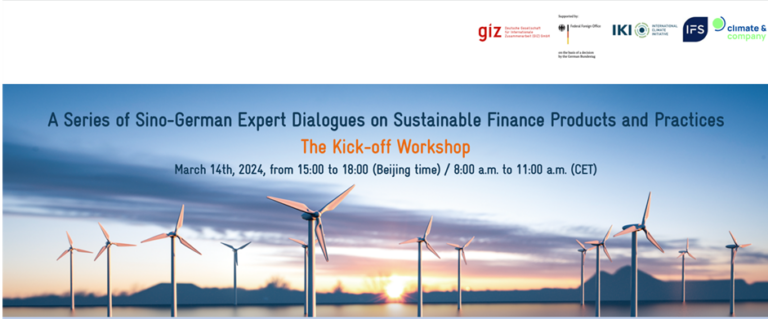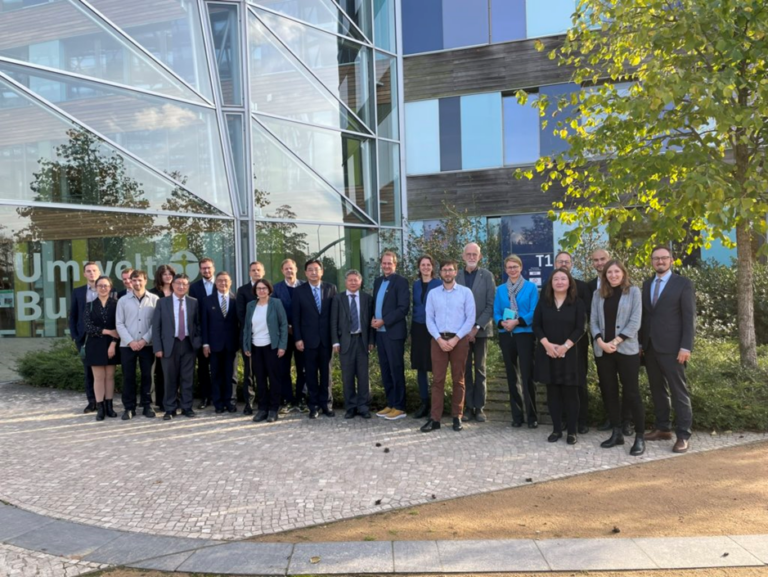On 2 December 2023, the side event entitled “From a Germany-China Track 2 Dialogue (T2D) Perspective: China’s and Germany’s Contribution to the Acceleration of the Renewable Energy Expansion in light of the Global Stocktake” took place at the German Pavilion at COP 28. Zhao Yingmin, Vice Minister of the Chinese Ministry of Ecology and Environment, and Jennifer Morgan, State Secretary of the German Foreign Ministry and Special Envoy for International Climate Action, delivered speeches. This event was jointly hosted by the German Environment Agency (UBA) and the Chinese National Center for Climate Change Strategy and International Cooperation (NCSC), and supported by GIZ.

In his keynote speech, Zhao Yingmin emphasized the global nature of the climate crisis and the severe impacts on developing countries. The Vice Minister highlighted China’s efforts in responding to climate change, including a significant reduction in carbon emissions intensity, increased non-fossil energy consumption, and substantial contributions to renewable energy generation. This among others, resulted in a decline of 51% of the carbon emissions intensity in 2022 compared to 2005. Vice Minister Zhao expressed satisfaction with the adoption of the Loss and Damage Fund at COP28. He underscored the importance of the global stocktake (GST) at the conference, focusing on implementing actions and cooperation to address gaps in mitigation, adaptation, finance, technology, and capacity building. Finally, the Vice Minister called for continued collaboration through the T2D mechanism, providing expert advice to China and Germany on climate change and deepening the green partnership with Germany and the European Union.
Meanwhile, Special Envoy Morgan reaffirmed the vital role of T2D in government decision-making and encouraged ongoing scientific collaboration for deeper mutual understanding and dialogue. The Special Envoy highlighted the significance of a global collective energy target, consisting of tripling renewable energy, doubling energy efficiency rates, and a just and step-by-step phase-out of fossil fuels, in the GST decision to stay below the 1.5-degree temperature limit. Special Envoy Morgan also commended China’s substantial increase in renewable energy capacity, touching upon studies predicting a decline in China’s greenhouse gas emissions in 2024. Noting Germany’s recent Energy Efficiency Act, she emphasized that Germany is willing to share its expertise on grid efficiency and solutions through the T2D. The expansion of flexible grids to enable the integration of high shares of renewable energies into the energy system is one major task right now. Still, it makes more economic sense than building new gas or coal-fired power plants as a backup. Germany already has some experience to share, as in 2023 more than half of Germany’s electricity consumption was covered by renewable energies, in some months even over 70 percent. Both keynote speeches expressed that the continued dialogue, in the context of the UNFCCC, is important for the collective direction of agenda-setting on emission reduction, and how renewable development in China has been impressive so far.
After the keynote speeches, UBA President Prof Dirk Messner introduced a panel discussion with Chinese and German senior experts on renewable electricity supply and capacity development and further expansion. This discussion covered reflections and concerns on the first GST, key findings from the IPCC and IEA reports on renewable energy, the status of China’s, Germany’s, and the European Union’s renewable energy development, and future scenarios. Additionally, topics such as energy security, just energy transition, and prospects for future renewables development were extensively discussed. Participants included Xu Huaqing (NCSC), Li Zheng (ICCSD of Tsinghua University), Christiane Textor (German IPCC Coordination Unit), Susanne Dröge (UBA), and Kevin Tu (Agora Energiewende).

The T2D exchanges are supported by the Sino-German Climate Partnership project of the GIZ, funded by the International Climate Initiative (IKI). It aims to provide opportunities for mutual learning based on relevant policy and scientific knowledge, exchange of best practices, and advice on implementation and goal setting. This side event with the Chinese and German Climate Envoys displayed Sino-German Cooperation on climate issues and promoted expert exchange on a just energy transformation in view of the first GST.



